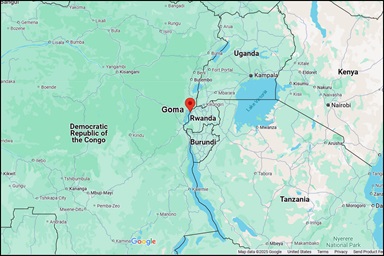Accessing rural villages in Nepal affected by the massive April 25 earthquake remains a significant challenge, say United Methodist missionaries there.
Katherine T. Parker is assigned by the United Methodist Board of Global Ministries to the United Mission to Nepal. She said the latter agency is working to bring assistance to Northern Dhading, where it has existing partnerships and knowledge of the local population.
how to help
Donations to support the response to the earthquake in Nepal and other international disasters can be made online through UMCOR Advance # 982450. Checks also can be made out to your local United Methodist church. Write UMCOR Advance #982450 on the memo line and put in the offering plate.
UMCOR health kits meet the practical needs of communities affected by disaster. As UMCOR works to assess needs in Nepal, donations help replenish UMCOR’s health kit inventory.
Many villages in Dhading, a district immediately west of Kathmandu, have high rates of earthquake damage, but reaching those areas is difficult.
“We are exploring both porters and mule trains as well as helicopters,” Parker said in an email to United Methodist News Service. “However, helicopters seem to be in short supply and high demand.”
As the earthquake’s death toll climbs past 7,000, the United Methodist Committee on Relief and other faith-based partners in the ACT Alliance are continuing to respond. Some 8 million people are affected and 3.5 million are in need of food assistance.
Nearly $317,000 in online gifts for UMCOR’s Nepal emergency and related Advance projects and missionary support through the Board of Global Ministries had been had been donated by Monday morning, May 4. UMCOR’s partners include the United Mission to Nepal and Global Medic.
Priority on poor and marginalized
While the focus in Dhading for United Mission to Nepal will remain on the poor and marginalized, “the specific emphasis and some approaches will change” because of the earthquake, Parker noted.
“We have already been working on community-based mental health issues and trauma healing throughout Nepal and anticipate an increased role here,” Parker explained, adding that community-led total sanitation also will remain a priority.
earthquake video update
Watch this ACT Alliance video update from Nepal by ACT member Finn Church Aid.
United Mission to Nepal has been working with several relief agencies to respond to immediate needs after the earthquake, especially CASA from India, a member of the ACT Alliance and partner with UMCOR on other disasters.
“My personal role in the response has been changing day to day, but I continue to provide support to the effort, while also conscious of other responsibilities in our work in long-term development,” Parker said.
In a May 4 situation report on its website, United Mission to Nepal reported that a team of paramedics has arrived in Dhading from United Mission Hospital Tansen, and were waiting to be dispatched to North Dhading.
Warehouse space for relief supplies also has been identified in Dhading and teams of volunteers have been trained and are ready to depart, with plans to start distribution to some 8,600 households by the end of the week.
Five districts have serious damage
Dr. Mark Zimmerman, a United Methodist missionary and medical doctor serving in Kathmandu as director of the Nick Simons Institute, called Dhading one of the five districts outside the Kathmandu Valley that were most serious affected. The others are Gorkha, Rasuwa, Nuwakot, and Sindhupalchok, he noted in an April 29 report.
“There are regions of these districts with 90 percent of houses uninhabitable; food, housing, and sanitation are acute issues,” he wrote in his observations. “The districts of Lamjung, Dolakha, Makwanpur, Kabre, and Lalitpur suffered moderate effects, other districts are minimal.
The World Health Organization has linked with Nepal’s Health Ministry “to coordinate an impressive deployment of medical teams from across the world,” he said. “In addition to these, the Nepal army has linked with military teams from other countries.”
U.S. Marines have now arrived in Nepal, according to a May 4 report from National Public Radio.
As immediate needs are met, public health issues will become more prevalent, Zimmerman said.
“Rebuilding Nepal will be the major task – housing, families, and institutions. The development organizations that have been here for decades will continue their work, only with heavier loads in these affected districts.”
Response is ‘enormous and chaotic’
In an earlier letter describing how their family and other churchgoers experienced the Nepal earthquake, his wife, Deirdre, noted that while people are being treated for their injuries “little in the way of any aid has reached the tens of thousands of people huddled around their devastated homes and villages.”
“The emergency response is enormous and chaotic as huge amounts of aid and personnel arrive into the country,” Deirdre Zimmerman wrote. “Our windows continue to tremble night and day, only now with the roar of foreign military transport planes arriving.
“Predictably, a government which struggles under the best of circumstances is now overwhelmed with both the need and the response, and much of the aid is log-jammed in Kathmandu,” she added.
Another United Methodist missionary couple serving in Nepal, Dr. Lester and Debbie Dornon, currently are in the U.S. but continue to receive updates from their daughter, Hannah, who is teaching there and from other colleagues and friends.
“The difficulty now is getting food to the villages … and getting shelter and blankets to the people who will need it until homes can be rebuilt,” they wrote in a recent blog post. “Safe drinking water is also a problem.”
Jennifer Wilson, the daughter of the Rev. Bob Wilson, pastor of First UMC in Pittsburgh, and his wife Glenna, chair of the Western Pennsylvania Conference Poverty Team, has been working as a volunteer for a project related to human trafficking victims in Kathmandu. She is safe and plans to stay in Nepal “as long as she can be helpful,” her father said.
Bloom is a United Methodist News Service multimedia reporter based in New York. Follow her at https://twitter.com/umcscribe or contact her at (646) 369-3759 or [email protected]
Like what you're reading? Support the ministry of UM News! Your support ensures the latest denominational news, dynamic stories and informative articles will continue to connect our global community. Make a tax-deductible donation at ResourceUMC.org/GiveUMCom.




